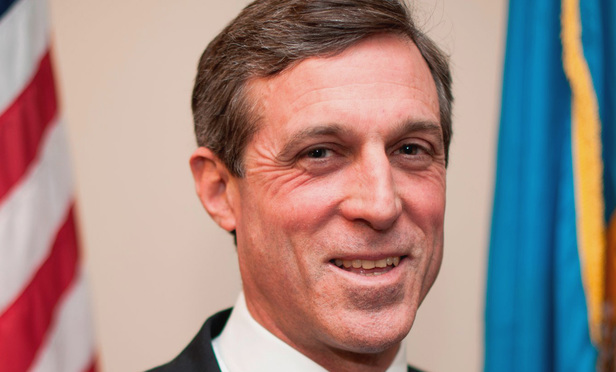Carney May Still Consider Party in Judicial Nominations, Lawyers Argue
Lawyers for the Carney administration are arguing in federal court that Gov. John Carney has the discretion to consider party affiliation in judicial nominations, despite a federal court ruling that struck down a provision of the Delaware Constitution that requires strict political balance among the state's judges.
March 08, 2018 at 06:18 PM
3 minute read
The original version of this story was published on Delaware Law Weekly
 John C. Carney Jr., D-Delaware. Credit: Wikimedia Commons
John C. Carney Jr., D-Delaware. Credit: Wikimedia Commons Lawyers for the Carney administration are arguing in federal court that Gov. John Carney has the discretion to consider party affiliation in judicial nominations, despite a federal court ruling that struck down a provision of the Delaware Constitution that requires strict political balance among the state's judges.
Attorneys for the governor responded on Wednesday to a motion from a local attorney asking a judge to hold Carney in contempt for ignoring a Dec. 6, 2017, ruling from U.S. Chief Magistrate Judge Mary Pat Thynge of the District of Delaware, which found the 120-year-old requirement violated the First Amendment by restricting government employment based on party affiliation.
David C. McBride, an attorney for Carney, said in a court filing that nothing in Thynge's memorandum opinion addressed other provisions preventing one political party from being represented by more than a “bare majority” of the judges on Delaware's courts. And he argued that Carney could still weigh a candidate's party association on a discretionary basis.
Carney has asked Thynge for clarification on both aspects of the ruling.
“The court has not entered an order specifically directing defendant to do or refrain from doing anything, as required for a contempt finding,” said McBride, a partner with Young Conaway Stargatt & Taylor. “Given the absence of such an order, plaintiff's motion presents no legal basis for a contempt finding, and it should be denied.”
A spokesman for the governor did not respond Thursday to a request for comment.
James R. Adams, a registered independent who successfully challenged the party-balance mandate last year, argued that a Feb. 19 posting for a Superior Court judgeship in Sussex County violated Thynge's ruling by indicating the governor's “preference” to nominate a Democrat to fill the vacancy.
“By announcing at the outset that he was going to select a candidate of a particular political party, Gov. Carney conceded that political affiliation was and is a substantial factor in his appointment decisions,” Adams' attorney, David L. Finger, wrote in a Feb. 21 filing.
Finger, of Finger & Slanina, said that Carney lacked the discretion to even consider party affiliation, which, he said, Carney had made a “controlling” factor in the nominating process.
“Either you can do it or you can't do it,” Finger said. When asked if Thynge's ruling was clear on that point, he responded: “Yes.”
Carney's attorneys have appealed the December ruling, but the U.S. Court of Appeals for the Third Circuit has stayed the case, pending a resolution to Carney's motion for reconsideration.
In Wednesday's filing, McBride said Carney would oppose any injunction once the reconsideration motion is decided, and he would ask Thynge to stay the case while it is on appeal, McBride said.
Carney's attorneys cited a “pressing need” to fill state court vacancies, including at least four this year. The governor, they said, has acted in good faith to meet his obligations under state and federal constitutional laws in trying to fill recent judicial openings.
“Absent a stay of the court's ruling, the impact of any judicial appointments filled by the governor prior to the resolution of this appeal will be felt by the public, and could disrupt the bipartisan nature of the Delaware judiciary, for years to come,” McBride wrote.
The case is captioned Adams v. Carney.
This content has been archived. It is available through our partners, LexisNexis® and Bloomberg Law.
To view this content, please continue to their sites.
Not a Lexis Subscriber?
Subscribe Now
Not a Bloomberg Law Subscriber?
Subscribe Now
NOT FOR REPRINT
© 2025 ALM Global, LLC, All Rights Reserved. Request academic re-use from www.copyright.com. All other uses, submit a request to [email protected]. For more information visit Asset & Logo Licensing.
You Might Like
View All
Zoom Faces Intellectual Property Suit Over AI-Based Augmented Video Conferencing
3 minute read
Etsy App Infringes on Storage, Retrieval Patents, New Suit Claims


Law Firm Sued for $35 Million Over Alleged Role in Acquisition Deal Collapse
3 minute readTrending Stories
- 1Uber Files RICO Suit Against Plaintiff-Side Firms Alleging Fraudulent Injury Claims
- 2The Law Firm Disrupted: Scrutinizing the Elephant More Than the Mouse
- 3Inherent Diminished Value Damages Unavailable to 3rd-Party Claimants, Court Says
- 4Pa. Defense Firm Sued by Client Over Ex-Eagles Player's $43.5M Med Mal Win
- 5Losses Mount at Morris Manning, but Departing Ex-Chair Stays Bullish About His Old Firm's Future
Who Got The Work
J. Brugh Lower of Gibbons has entered an appearance for industrial equipment supplier Devco Corporation in a pending trademark infringement lawsuit. The suit, accusing the defendant of selling knock-off Graco products, was filed Dec. 18 in New Jersey District Court by Rivkin Radler on behalf of Graco Inc. and Graco Minnesota. The case, assigned to U.S. District Judge Zahid N. Quraishi, is 3:24-cv-11294, Graco Inc. et al v. Devco Corporation.
Who Got The Work
Rebecca Maller-Stein and Kent A. Yalowitz of Arnold & Porter Kaye Scholer have entered their appearances for Hanaco Venture Capital and its executives, Lior Prosor and David Frankel, in a pending securities lawsuit. The action, filed on Dec. 24 in New York Southern District Court by Zell, Aron & Co. on behalf of Goldeneye Advisors, accuses the defendants of negligently and fraudulently managing the plaintiff's $1 million investment. The case, assigned to U.S. District Judge Vernon S. Broderick, is 1:24-cv-09918, Goldeneye Advisors, LLC v. Hanaco Venture Capital, Ltd. et al.
Who Got The Work
Attorneys from A&O Shearman has stepped in as defense counsel for Toronto-Dominion Bank and other defendants in a pending securities class action. The suit, filed Dec. 11 in New York Southern District Court by Bleichmar Fonti & Auld, accuses the defendants of concealing the bank's 'pervasive' deficiencies in regards to its compliance with the Bank Secrecy Act and the quality of its anti-money laundering controls. The case, assigned to U.S. District Judge Arun Subramanian, is 1:24-cv-09445, Gonzalez v. The Toronto-Dominion Bank et al.
Who Got The Work
Crown Castle International, a Pennsylvania company providing shared communications infrastructure, has turned to Luke D. Wolf of Gordon Rees Scully Mansukhani to fend off a pending breach-of-contract lawsuit. The court action, filed Nov. 25 in Michigan Eastern District Court by Hooper Hathaway PC on behalf of The Town Residences LLC, accuses Crown Castle of failing to transfer approximately $30,000 in utility payments from T-Mobile in breach of a roof-top lease and assignment agreement. The case, assigned to U.S. District Judge Susan K. Declercq, is 2:24-cv-13131, The Town Residences LLC v. T-Mobile US, Inc. et al.
Who Got The Work
Wilfred P. Coronato and Daniel M. Schwartz of McCarter & English have stepped in as defense counsel to Electrolux Home Products Inc. in a pending product liability lawsuit. The court action, filed Nov. 26 in New York Eastern District Court by Poulos Lopiccolo PC and Nagel Rice LLP on behalf of David Stern, alleges that the defendant's refrigerators’ drawers and shelving repeatedly break and fall apart within months after purchase. The case, assigned to U.S. District Judge Joan M. Azrack, is 2:24-cv-08204, Stern v. Electrolux Home Products, Inc.
Featured Firms
Law Offices of Gary Martin Hays & Associates, P.C.
(470) 294-1674
Law Offices of Mark E. Salomone
(857) 444-6468
Smith & Hassler
(713) 739-1250






